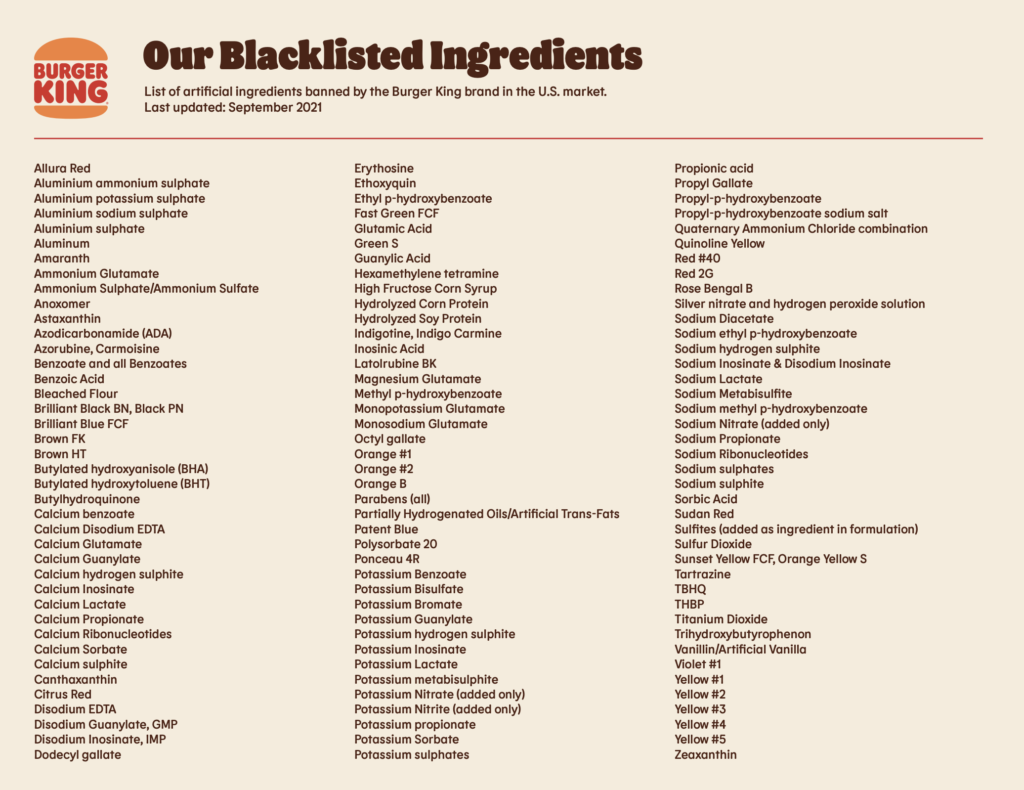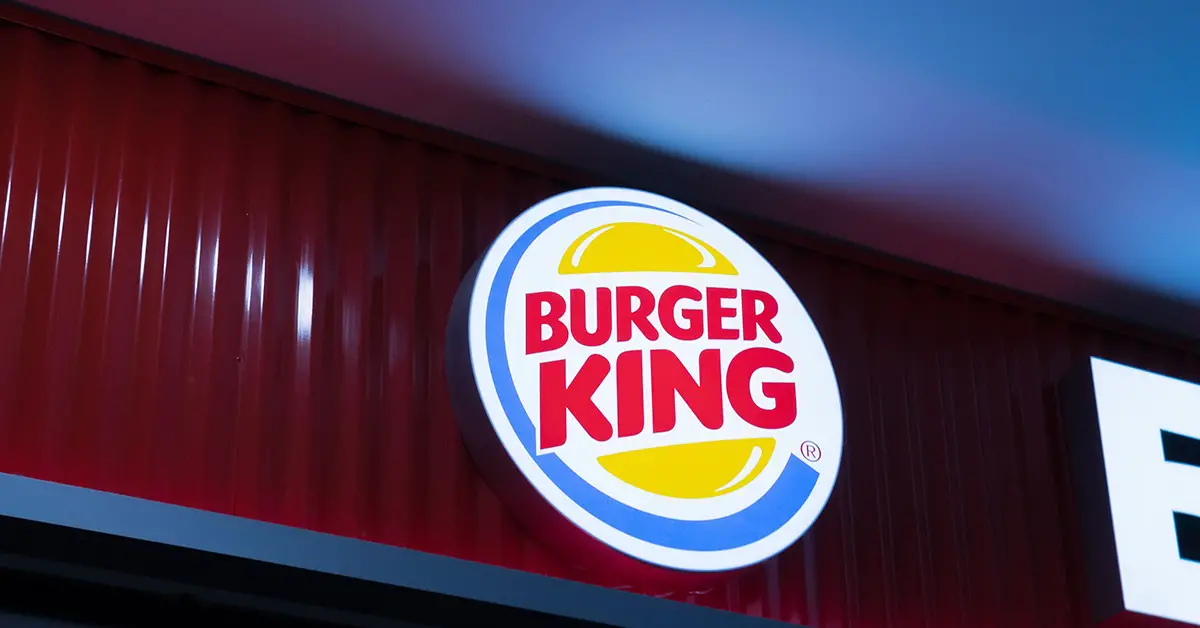In a new marketing campaign, Burger King has announced that it’s blacklisting 120 artificial ingredients, including high-fructose corn syrup, food dyes, and preservatives, from its menus. This campaign seems to be an extension of the company’s 2020 ad to distance their food from artificial ingredients. That ad featured a time-lapse of a Whopper aging and molding. The gist of the video is that the burger is ‘real food’ with ‘natural’ ingredients that decay.
“We know our guests’ expectations are changing, and they want to make choices they can feel good about,” said Ellie Doty, Burger King North America’s chief marketing officer. “We’re confident that our ongoing commitment to real food will not only provide guests with the food they’re looking for but also set a standard for the industry overall.” [1]
Burger King’s Viral ‘Real Food’ Ad
The moldy burger commercial was divisive, and that controversy gave the video even more press. At first, the company promoted its additive-free whopper, but all of its food will also become free of artificial colors, flavors, and preservatives. The moldy burger video was a stark contrast to the typically appealing style of food promotion. [2]
While the ad is undeniably striking, it may have sent the wrong message. The tagline of the commercial is “The beauty of real food is that it gets ugly”. Burger King’s use of the term ‘real food’ sends the message that their food has only good-for-you ingredients. After all, if a food doesn’t rot, it must be full of toxic preservatives, right? But this is a widespread misunderstanding. After all, honey is a natural, healthy food that does not rot. And what about long-lasting dehydrated foods like dates, raisins, and beef jerky? Perhaps the discussion is not about so-called ‘real food’ but about the process of dehydrating foods. After all, that easily debunks “if it rots, it’s from natural ingredients” idea.
Furthermore, there was backlash over a timelapse video of a McDonald’s meal that did not mold. Many people pointed to this as proof of how ‘unnaturally preserved’ this food was. And let’s be clear, no one is saying a fast food meal is healthy. But is the fact that it’s long-lasting what makes it unhealthy? As we’ve seen with good long-lasting foods like dates and honey, that cannot necessarily be it.
Read: Handy Chart Shows You How Long You Can Freeze Different Foods
If a food molds, does it mean its healthier than one that doesn’t? Not exactly.
A food scientist and chemical engineer who goes by the pseudonym The Food Science Babe explains what causes food to mold or not mold. And it all comes down to water versus dryness and what is called the “water activity” of a given food. “Moisture migrates from areas of high aw to areas of low aw until equilibrium is established. So, if the water activity of the food is greater than that of the surrounding air, the moisture will migrate from the food to the air, thereby decreasing the water activity of the food. If the equilibrium water activity is lower than what is required for mold and bacterial growth and is reached before any microorganisms have had a chance to grow, then mold and bacteria simply won’t be present on the resulting dried out food.” [3] This is why bread will grow mold faster than toasted bread. It’s all about the moisture levels.
She argues the Whopper in the video may not have molded if it was dried up and kept in a dry environment. Plus, while preservatives limit mold growth, they won’t last forever. Eventually, mold comes. However, there are potential benefits to preserving food. For instance, the food could be eaten for longer, which could prevent foodborne illnesses and reduce waste. For these reasons, artificial preservatives don’t deserve to be equated with toxic chemicals.
But banning artificial ingredients gives the illusion of being “safer” and “healthier”. So Burger King is trying to give the impression their food is good for you without really changing their unhealthy recipes. Essentially, this campaign feeds into the incorrect fear-mongering about preservatives for their own financial gain.
That’s not to say that all of the 120 ingredients on the blacklist are safe. Many studies show the negative effects of certain food dyes and ingredients like artificial trans fats and sodium nitrate, to name a few. However, there are also safe food ingredients getting thrown out with the bathwater because of the myth of “artificial ingredients bad”.
“Again, this is nothing but another fear-based marketing campaign,” the Food Science Babe concludes in a Facebook post. [4]
‘Real Food’ Doesn’t Equate ‘Healthy Food’
Additionally, Abby Langer, R.D., author of Good Food, Bad Diet summarised this Burger King campaign perfectly. “The marketing tactic of banning artificial flavors and colors doesn’t necessarily make burgers and fries all that much healthier. In fact, many of the ingredients on the list, such as MSG, vanillin, bleached flour, glutamic acid, and astaxanthin are completely harmless. Burger King is still fast food that’s mostly ultra-processed.” [5]
Also, the blacklist of these ingredients accompanies Burger King’s collaboration with celebrities. This collaboration involves the stars curating their own “Keep It Real Meals” by hand-picking items from the menu. For instance, the Cornell Haynes Jr. (AKA rapper Nelly) Meal, which includes a Whopper with cheese, lettuce, tomato, onions, mayo and ketchup, small fries, and a small Sprite. Plus, there’s the Chase Hudson (AKA TikTok star Lil Huddy) Meal, which involves a Spicy Ch’King with cheese, 4-piece mozzarella sticks, and a 16 oz. chocolate shake. [6]
Call it ‘real food’ all you want, that doesn’t make these meals healthy. More ‘natural-sounding’ and ‘real’ ingredients like salt, hydrogenated oils, and sugar, for instance, have their own negative effects on the human body. But it’s much more difficult to make fast food without them, so let’s throw out the artificial ingredients, some of which don’t deserve to be vilified. While taking the truly unhealthy artificial ingredients off the menu is objectively a good move, Burger King seems more focused on working with the illusion of health rather than the actual science. Though we suppose a lot of marketing can be just that — an illusion.

Keep Reading: What Food Product Came Out the Year You Were Born?
Sources
- Mary Meisenzahi. “Burger King is banning 120 artificial ingredients from menus — see the full list.” Business Insider. September 9, 2021
- Lucy Handley. “Burger King’s moldy Whopper ad is dividing marketing experts.” CNBC. February 20, 2020
- Food Science Babe. “‘Real food gets ugly,’ says Burger King. But what does science say?” AG Daily. February 26, 2020
- Food Science Babe. Facebook. February 22, 2020
- Paul Kita. “Burger King’s Banning of 120 Ingredients Is Pure Health Haloing.” Men’s Health. September 9, 2021
- Sabrina Weiss. “Burger King Bans 120 Artificial Ingredients from Its Menu to Deliver ‘Real Food’ to Customers.” People. September 10, 2021

